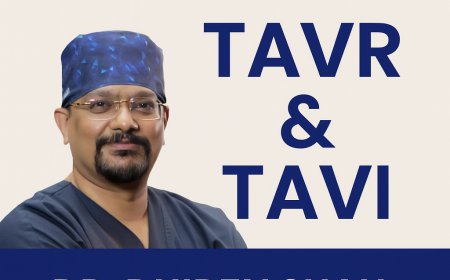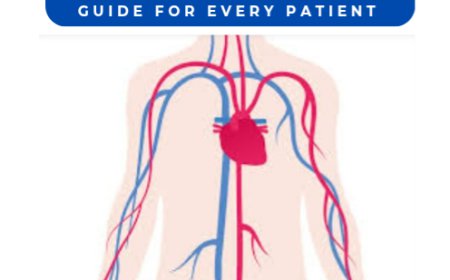Practice with Integrity – A Doctor’s Guide to Being Honest with Patients about Surgery
“Practice with Integrity” – A Doctor’s Guide to Being Honest with Patients about Surgery by Dr. Dhiren Shah

“Practice with Integrity” – A Doctor’s Guide to Being
Honest with Patients about Surgery
For Surgeons, Physicians, and Specialists Committed to Patient-Centered Ethics
Inspired by the professional standards upheld by Dr. Dhiren Shah, Senior Cardiac Surgeon, Marengo CIMS Hospital, Ahmedabad
Introduction: The Sacred Trust Between Doctor and Patient
When a patient walks into your clinic, they bring more than a body that needs diagnosis. They bring trust. That trust must be protected—especially when decisions involve major surgeries that can affect their life, finances, family, and long-term health.
As doctors, our responsibility is not to persuade or sell procedures, but to guide patients with honest intent, placing their welfare above all else.
This guide outlines how to ethically navigate the delicate balance between medical advice, patient fear, and clinical necessity—without bias, pressure, or exaggeration.
1. Understand the Difference Between Recommendation and Persuasion
Recommendation:
-
“Based on your tests and symptoms, surgery may be the right path. Let’s go through why.”
Persuasion:
-
“You should get this done immediately. If you delay, things could get very bad.”
Recommendation is educational. Persuasion is emotional.
Stay on the side of education, always.
2. When Surgery is NOT Urgently Required
You may encounter patients:
-
With borderline or stable conditions
-
With early-stage valve or artery disease
-
Seeking a second opinion for preventive surgery
What to Do:
-
Explain all options, not just surgical
-
Use visuals, imaging, and analogies for clarity
-
Offer statistics and outcome data—without drama
-
Suggest lifestyle changes, medications, or monitoring if applicable
“You don’t need surgery now. But we’ll monitor you closely. I’m here for you if it progresses.”
This honesty builds lifelong trust—and often brings the patient back to you if surgery becomes necessary later.
3. Avoid Overpromising Outcomes
Don’t Say:
-
“After this surgery, you’ll be perfectly fine forever.”
-
“This is a routine procedure, nothing to worry.”
Instead Say:
-
“We aim to improve your quality of life and reduce future risks. But no surgery is 100% without potential complications.”
-
“Let’s discuss what recovery looks like and how we’ll support you post-op.”
Honest framing reduces unrealistic expectations and improves compliance later.
4. Navigating Second Opinions Gracefully
If a patient seeks a second opinion—or is hesitant about surgery:
Do:
-
Encourage it openly
-
Offer to share test results with another doctor
-
Reassure them they’re not offending you
Say:
“That’s a wise step. I want you to feel confident in your decision. I’m happy to support you whichever path you choose.”
This response earns you respect—and often reaffirms your credibility.
5. Handling Institutional Pressure or Patient Demand
Sometimes, hospitals, peers, or even the patient’s family may pressure you to "go ahead with surgery." The ethical duty lies in independent clinical judgement.
If the surgery is unnecessary:
-
Document your recommendation carefully
-
Explain it to both patient and family in writing
-
Offer a re-evaluation timeline or alternate treatment plan
Stand your ground respectfully. Good doctors are remembered for integrity, not income.
6. Long-Term Benefits of Honest Practice
-
Patients return even after being told "you don’t need surgery"
-
They refer others to you because of your ethical clarity
-
Your reputation as a trustworthy doctor outweighs your surgical count
-
You sleep better, knowing every procedure was justified
7. Communication Templates for Ethical Practice
If surgery is NOT required:
“Looking at your current reports and symptoms, surgery isn’t necessary now. We can manage this with medication and lifestyle. I will monitor you regularly.”
If surgery is only preventive:
“We can consider surgery to prevent future risk, but you are stable now. Let’s weigh the benefits and risks together.”
If surgery is urgent:
“Your condition is critical, and without intervention, there is a risk to life or major complications. I recommend surgery and am here to explain every step to you and your family.”
8. Final Words: Being the Doctor You’d Want for Yourself
Imagine your own parent, spouse, or child sitting in front of a surgeon. Would you want them to be pressured—or fully informed?
That is the standard you should offer every single patient.
No matter how skilled your hands, it is your integrity that leaves the greatest impact.
“Surgery should be your service to life—not your shortcut to income.” – A principle Dr. Dhiren Shah upholds
What's Your Reaction?
 Like
0
Like
0
 Dislike
0
Dislike
0
 Love
0
Love
0
 Funny
0
Funny
0
 Angry
0
Angry
0
 Sad
0
Sad
0
 Wow
0
Wow
0
























